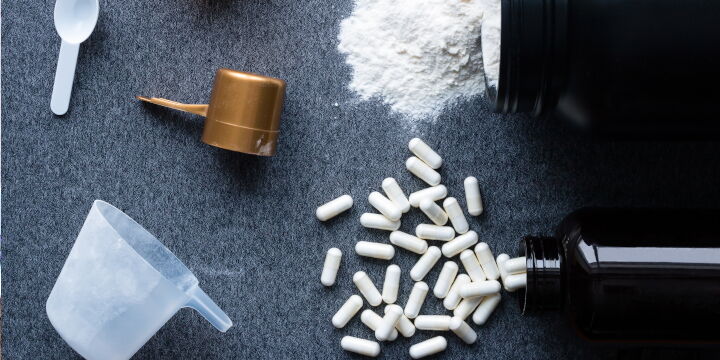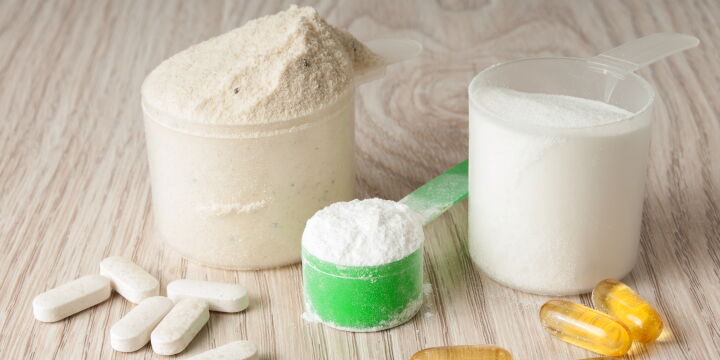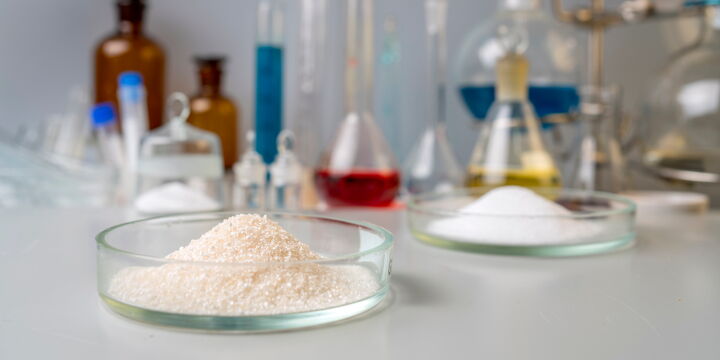What is creatine and what is its main function?
Creatine is a compound produced from amino acids, naturally present in the human body.
In the body is stored largely in the muscles (about 95%) while the remainder is distributed in the brain and, for men, in testicles.
The synthesis of endogenous creatine, or that synthesized by our body, occurs in three main organs:
- the liver where the synthesis of most of the creatine takes place
- pancreas
- kidneys
The amino acids used for the synthesis of creatine are: arginine, glycine and methionine.
A very high amount of creatine stored in the muscles is combined with the phosphate groups by the creatine kinase enzyme and gives rise to creatine phosphate, which accounts for about two thirds of total creatine.
The endogenous synthesis of creatine isn't the only mode of production and accumulation of this compound, in fact creatine can be taken through food mainly contained in meat and fish and in the form of food supplements.

The main function of creatine is carried out following the combination with the phosphate groups by the creatine kinase enzyme, giving rise to creatine phosphate, which is used as a source of phosphates for the restoration of ATP.
The phosphate system is one of the three mechanisms that our body uses to dispose of ATP; a molecule whose bonds have a high energy content, which is released in conjunction with their breakdown and used in processes such as muscle contraction.
Creatine phosphate therefore acts as a reserve of phosphate groups for the transformation of adenosine phosphate into adenosine tri phosphate, when the latter is used in the context of high intensity and short duration exercise.

Creatine and sport
Creatine is one of the most popular supplements among those who practice sports.
Creatine supplementation, through the use of food supplements, has proven to be able to increase muscle stores to a level 20-40% higher than that observed in subjects who do not use supplements.
In fact, in an omnivorous diet, the daily creatine intake is equal to 1-2 grams per day, this allows to saturate the muscle creatine stores by 60-80%.
The greater amount of creatine and creatine phosphate, obtained thanks to supplementation with supplements, translates into a greater amount of energy available to perform high intensity and short duration efforts.
As mentioned above, those who practice activities in which high intensity and short duration efforts are performed, such as repeated sprints and maximal efforts, benefit from the use of this supplement. During this type of activity, creatine phosphate stocks can be significantly reduced and if the high intensity activity is prolonged, it can reach a condition of almost total exhaustion.
Generally two different protocols are used for creatine intake:
- involving a loading phase
- not involving loading phase
In the event that the loading phase is foreseen, 20 g of creatine are taken per day, divided into doses of 5 grams for a period of 5-7 days.
Following the loading phase, a maintenance phase follows in which the intake drops to 3-5 g per day, which can even reach 10 for very trained athletes with high body weight.
The second protocol, on the other hand, requires that 3 g of creatine be taken per day, without carrying out the loading phase.
In both cases, saturation is reached, however in the second case more time is required, about 30 days.
In both cases, saturation is reached, however in the second case more time is required, about 30 days.
At the end of the intake period, if muscle saturation has been reached, it takes 4 to 6 weeks for creatine levels to return to the level prior to supplementation.

Safety of creatine intake
The widespread use of creatine supplements has meant that many studies have been carried out to verify their safety for health.
From the numerous analyzes it emerged that the appropriate use of creatine isn't correlated with the onset of pathologies in healthy subjects both in the short and long term.
The scenario is different for those suffering from kidney diseases or related diseases, for which creatine supplementation seems to be not recommended.
Conclusions
Supplementation through the use of creatine has proven to be a valid and safe tool for athletes who are in good health, engaged in intense and repeated activities, interested in increasing performance.
Thanks to the easy availability of this food supplement and with the help of a health professional, who can advise how and when to take creatine, its possible for everyone to enjoy the effects it has on sports performance.
This should make us reflect on the fact that what is effective isn't always complex and that by relying on health professionals able to refer to authoritative sources, you can take advantage of valid, very effective and affordable tools without exposing yourself to unnecessary risks.
